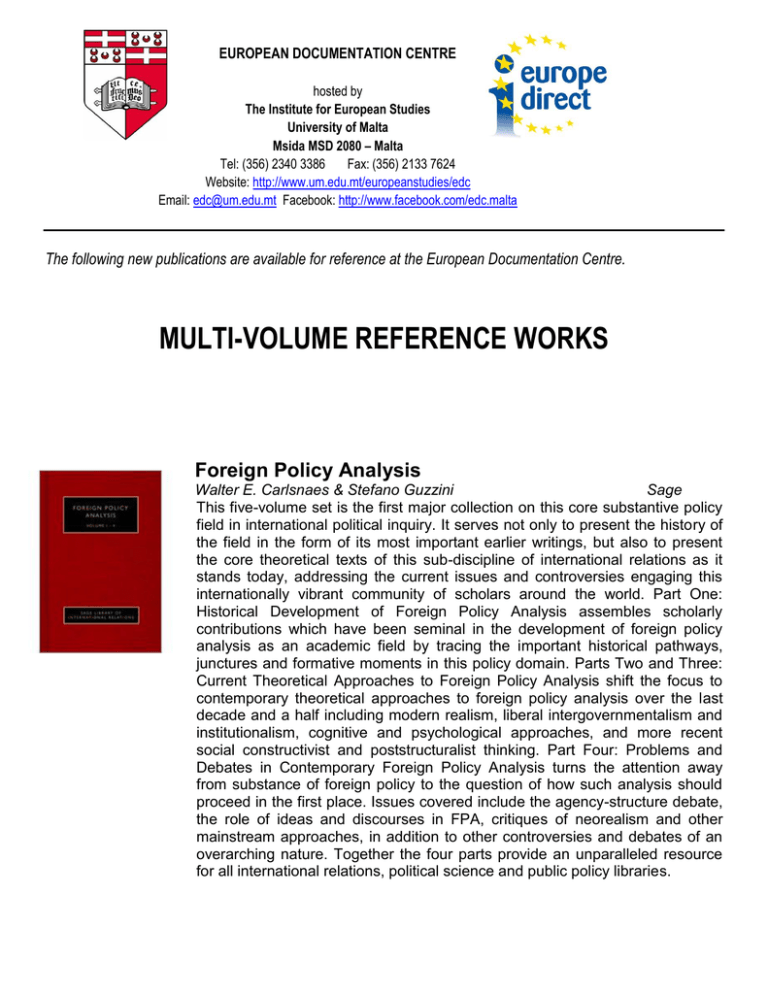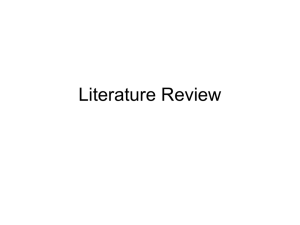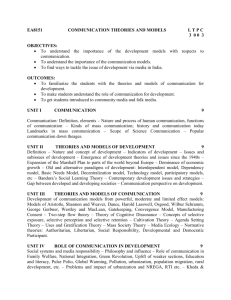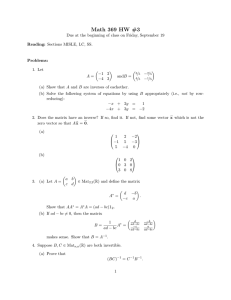MULTI-VOLUME REFERENCE WORKS Foreign Policy Analysis
advertisement

EUROPEAN DOCUMENTATION CENTRE hosted by The Institute for European Studies University of Malta Msida MSD 2080 – Malta Tel: (356) 2340 3386 Fax: (356) 2133 7624 Website: http://www.um.edu.mt/europeanstudies/edc Email: edc@um.edu.mt Facebook: http://www.facebook.com/edc.malta The following new publications are available for reference at the European Documentation Centre. MULTI-VOLUME REFERENCE WORKS Foreign Policy Analysis Walter E. Carlsnaes & Stefano Guzzini Sage This five-volume set is the first major collection on this core substantive policy field in international political inquiry. It serves not only to present the history of the field in the form of its most important earlier writings, but also to present the core theoretical texts of this sub-discipline of international relations as it stands today, addressing the current issues and controversies engaging this internationally vibrant community of scholars around the world. Part One: Historical Development of Foreign Policy Analysis assembles scholarly contributions which have been seminal in the development of foreign policy analysis as an academic field by tracing the important historical pathways, junctures and formative moments in this policy domain. Parts Two and Three: Current Theoretical Approaches to Foreign Policy Analysis shift the focus to contemporary theoretical approaches to foreign policy analysis over the last decade and a half including modern realism, liberal intergovernmentalism and institutionalism, cognitive and psychological approaches, and more recent social constructivist and poststructuralist thinking. Part Four: Problems and Debates in Contemporary Foreign Policy Analysis turns the attention away from substance of foreign policy to the question of how such analysis should proceed in the first place. Issues covered include the agency-structure debate, the role of ideas and discourses in FPA, critiques of neorealism and other mainstream approaches, in addition to other controversies and debates of an overarching nature. Together the four parts provide an unparalleled resource for all international relations, political science and public policy libraries. International Relations of the European Union Wyn Rees & Michael H. Smith Sage From its beginnings as a trading organization the European Union (EU) has become an immensely important actor in the international system. This collection distils the very best writings, both classic and contemporary, in the field of its international relations across a range of policy fields. The selected articles and chapters reflect the breadth of the EU's activities in the world, including its economic and security relationships, as well as its unique status in the academic study of international relations. The SAGE Library of International Relations brings together the most influential and field-defining articles, both classical and contemporary, in a number of key areas of research and inquiry in International Relations. Each multi-volume set represents a collection of the essential published works collated from the foremost publications in the field by an editor or editorial team of renowned international stature. They also include a full introduction, presenting a rationale for the selection and mapping out the discipline's past, present and likely future. This series is designed to be a 'gold standard' for university libraries throughout the world with an interest in International Relations. Federalism John Kincaid Sage In 1968, Carl J. Friedrich, a prominent Harvard political scientist, suggested that federalism was not, as many observers then believed, an anomaly in the modern era, but rather a mode of governance that was moving to the forefront of political necessity and desirability in the second half of the twentieth century. This was a prescient observation. Federalism has become a leading mechanism for addressing problems of human diversity and political scale, both small and large. It establishes unity on the basis of consent while preserving diversity by constitutionally uniting separate political communities into a limited, but encompassing, polity. This major reference collection, edited by one of the foremost scholars in the field, grapples with a large body of knowledge that does not neatly divide into theoretical categories and imposes a structure for the purposes of studying this complex political structure and process of governance. There is little significant consensus among scholars of federalism as to what constitutes the field and its subdivision so this four volume set attempts to signpost and map out the field for researchers, postgraduates and political scientists in general. Volume One: Theories of Federalism Volume Two: Comparative Federalism Volume Three: Practices of Federalism Volume Four: Potentials of Federalism International Encyclopedia of Political Science Bertrand Badie , Dirk Berg-Schlosser & Leonardo Morlino Sage With entries from leading international scholars from around the world, the International Encyclopedia of Political Science provides a definitive, comprehensive picture of all aspects of political life, recognizing its theoretical foundations and including empirical findings from across the globe. The eight volumes examine all the main subdisciplines of political science and include coverage of comparative politics, epistemology, political economy, political sociology, and international relations. Entries are arranged in alphabetical order, and a list of entries by subject area appears in the front of each volume for ease of use. The Encyclopedia contains a detailed index as well as extensive bibliographical references. Approximately 80 entries on the use of both qualitative and quantitative research methods in political science are provided. The process of democratization will remain a vital topic during the 21st century, and the encyclopedia contains extensive coverage of the evolution of democracy as well as other political systems. Readers will find theoretical and empirical background on other important issues such as global security, the relationship between religion and the state, and political issues related to gender and race/ethnicity. Approaches to International Relations Stephen Chan & Cerwyn Moore Sage This four-volume collection of seminal journal articles and book excerpts examines traditional approaches to international relations as well as critical, radical and non-Western theories of global politics. The set includes a detailed introduction by the editors and is designed to complement their successful set Theories of International Relations. Volume 1 - Approaches to Theory in International Relations will focus on the historical development of the discipline and touch upon key issues and key debates, Volume 2 on Approaches to Theory in International Relations will examine themes and theories, Volume 3 on the radical and inter-disciplinary Approaches to International Relations, and Volume 4 on Non-Western Approaches to International Relations. Regionalism Philippe de Lombaerde & Dr Fredrik Soderbaum Sage This four-volume set has been created to capture and organise 60 years of research and policy discourse on regional integration and regionalism. Since the mid-1980s there has been an explosion of various forms of regionalist projects on a global scale. The widening and deepening of the European Union (EU) is the most pervasive example, but regionalism is also made visible through the revitalization or expansion of many other regional projects around the world. With a strong global focus on the field, this new major work will be of great value to the international academic community, collating and presenting seminal articles written by scholars from around the globe. The volumes are structured chronologically, reflecting the evolution of the subject: Volume One: 1940s-1960s Classical Regional Integration Volume Two: 1970s1980s Revisions of Classical Regional Integration Volume Three: 1990s- The New Regionalism Volume Four: 2000-2010 Comparative Regionalism INTERNATIONAL MIGRATION Andrew Geddes Sage This collection brings the best research into migration across state borders together. Reflecting the complexity and diversity of work in this area, the set draws on the work of sociologists, lawyers, economists, political scientists and geographers as well as international relations scholars. Andrew Geddes' selection examines the causes, modes, patterns and consequences of international migration and demonstrates how its analysis requires connections to be made between the domestic and the international. INTERNATIONAL ETHICS Mervyn Frost Sage Actors in international politics need to navigate a host of ethical challenges when deciding how to act in a certain context. They are confronted by the question: 'What, from an ethical point of view, ought I to do?' with regard to a wide range of issues including the conduct of war, the just distribution of aid and trade, human rights, the care of the global environment, the rights of asylum seekers and refugees, genocide, money-laundering, global terror and many others. This collection looks at classical and seminal research in the field with the broad framework of the moral standing of states; the moral standing of non-state actors; and the ethics of international relations. Volume One: The Society of States Volume Two: Global Civil Society: Non-State Actors in World Politics Volume Three: The Changing Constitution of Global Politics Volume Four: Ethics and Foreign Policy INSTITUTIONALISM II B. Guy Peters & Jon Pierre Sage "Institutionalism" (SAGE 2007) captured a good deal of the literature at the time it was published; however, there have been numerous excellent contributions to the literature since that time. This second collection comprises three volumes. "Volume One: Developing Institutional Theory" collects together papers representing developments in the various approaches to institutionalism contained in the first series of volumes. "Volume Two: New Research Agendas" addresses new recent strands of development in institutionalism namely Discursive Institutionalism, Institutionalization and Micro-foundations of Institutional Behaviour. "Volume Three: Applying Institutional Theory" looks at the empirical applications of the developments in theoretical approaches. These empirical analyses not only demonstrate the insights that institutionalism can provide but also help in the further development of the theory. Encyclopedia of Political Theory Mark Bevir Sage In discussing a topic, political science lecturers and course textbooks often toss out the name of a theorist or make a sideways reference to a particular theory and move on, as if assuming their student audience possesses the necessary background to appreciate and integrate the reference. However, academic librarians can tell you this is usually far from the case. Students often approach them seeking a source to provide a quick overview of a particular theory or theorist with just the basics: the who, what, where, how, and why. And librarians often find it difficult to guide these students to a quick, one-stop source. SAGE Reference presents the three-volume Encyclopedia of Political Theory, available in both print and electronic formats. This work serves as a reference source for anyone interested in the roots of contemporary political theory. Drawing together a team of international scholars, it examines the global landscape of all the key theories and the theorists behind them, presenting them in the context needed to understand their strengths and weaknesses. In addition to interpretations of long-established theories, it also offers essays on cutting-edge research as one might find in a handbook. And, like an unabridged dictionary, it provides concise, to-the-point definitions of key concepts, ideas, schools, and figures. Coverage includes: -Ancient Theory -Medieval Theory -Early Modern Theory -Enlightenment -Modern Theory -Constitutionalism -Liberalism -Critical Theory -Continental Theory -Empirical Theory -Comparative Political Thought.





